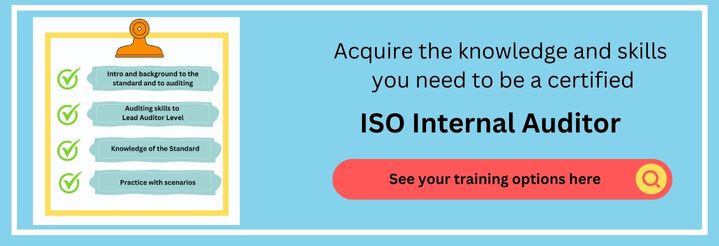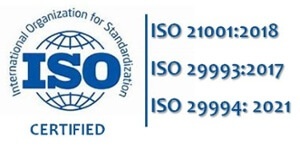
Have you any objective evidence to demonstrate such competence?
ISO Management System Standards require that persons involved in such systems be competent, and training is an essential part of building such competence.
Let’s consider internal auditing of the 2 most popular management system standards: ISO 9001, the quality management system (QMS)standard, and ISO 14001, the environmental management system (EMS) standard.
Let's also consider the frequently heard claim that 'we've not had a problem with internal auditing until now'.
Well, that has changed; in fact, it changed 7 years ago, but few noticed!
Why Choose 7-year-old Standards as Examples?
It's because Internal Audit Programmes and Internal Audit Reports continue to demonstrate on a very regular basis that the requirements relating to Internal Audits are not adequately addressed. Furthermore, incompetent internal ISO auditors are commonplace. What's worst is this is 7 years after requirements changed!
In this article, we set 5 reasons why such training is a ‘must’, the first 3 arising directly from the Standards themselves, and the final 2 is concerned with maximizing the benefits that can be achieved with best internal auditing practice.
Reasons why Assessing the Competence of Your Auditors is a Must
Historically, internal auditors have not been formally trained, and Certification Bodies (CBs) have accepted this practice.
Furthermore, CBs have accepted internal audit programs based solely on the auditing of procedures, work instructions, and other lower-level documents.
With many organizations now migrating to the 2015 standards, the question arises as to whether the traditional approach will continue to be acceptable.
Examination of ISO 9001:2015 and/or ISO 14001:2015 clearly indicates that formal training will be necessary, and here are 5 reasons why.
Reason 1: Major Changes in ISO 9001 and ISO 14001 Standards
Major changes have been made to both standards, including many for which documented procedures are unlikely to exist. Consider just four such examples:
- Context of the organization, where the monitoring and review of information regarding external and internal issues affecting the organization is an entirely new concept
- Leadership, where the involvement of management is greatly expanded, and the need to involve top management in internal audits is a requirement,
- Planning, where the auditing of actions to address risks and opportunities is now a requirement and, consequently, an understanding of the application of these terms is needed and
- Organizational knowledge, where both the consideration of tangible and intangible assets is needed.
Internal Auditors will need to understand these terms as well as their interpretation and application.
Reason 2: The requirements of ISO 9001:2015 Clause 9.2 Internal Audits
Could someone auditing the effectiveness of the implementation of procedures alone fulfill the requirements here? Sub-clause 9.2.1 a) 2) requires audit evidence on whether the QMS/EMA conforms to ‘the requirements of this International Standard’.
Without training, it is unlikely that an internal auditor will understand the requirements relating to policy, processes, procedures, and other documentation (including records).
Reason 3: The requirements of ISO 9001:2015 Clause 7.2 Competence
Sub-clause b) here describes competence as an appropriate combination of ‘education, training or experience’. Note that here the word ‘or’ is inclusive and should be interpreted as ‘and/or’.
Sub-clause c) requires the organization to ‘take actions to acquire the necessary competence’.
Education and experience alone cannot make someone a competent internal auditor. And ‘sit by Nellie’ is hardly an effective or credible training method.
Any reasonable interpretation of clause 7.2 requires internal auditors to be formally trained.
We next turn to two reasons concerned with turning internal auditing into an opportunity:
Reason 4: To Secure the benefits of Good Auditing Techniques
To thoroughly audit a QMS/EMS, it is necessary that internal auditors mimic the behavior of CB auditors. External ISO auditors use many sources of information, which will vary depending on the scope and complexity of the audit and may include the following:
- interviews with employees and other persons;
- observations of activities and the surrounding work environment and conditions;
- documents, such as policy, objectives, plans, procedures, standards, instructions, licenses and permits, specifications, drawings, contracts, and orders;
- records, such as inspection records, minutes of meetings, audit reports, records of monitoring programs and the results of measurements;
- data summaries, analyses, and performance indicators;
- information on the auditee’s sampling programs and on procedures for the control of sampling and measurement processes;
- reports from other sources, for example, customer feedback, other relevant information from external parties, and supplier ratings;
- computerized databases and websites.
Without training in these techniques, it is likely that weaknesses and non-compliances will be left undetected and be found subsequently by external auditors.
Reason 5: To Harvest Improvement Suggestions
Internal audits offer convenient and relaxed opportunities for personnel at all levels and functions within the organization to point out defects in systems and procedures. They also suggest many small improvements (and occasionally major improvements) to management systems.
By capturing, reviewing, and implementing these suggestions, you help ensure the robustness of the QMS/EMS. Every non-conformance avoided represents a real saving of time, money, and other resources.
Consider for a moment how much better your internal audits would be in gathering interview evidence and in identifying improvement opportunities if they followed the following 5-step guide:
- Begin with Open Questions (as in ‘open-ended’ - What is the role of your function? How do you do that?)
- Ask Specific Questions to get specific information (Which were the lot numbers involved?)
- Ask ‘What-if’ Questions to get more information on a topic.
- Ask to see the records, documents & other evidence
- Listen; don’t talk except to ask questions or paraphrase answers.
It is only with trained internal auditors familiar with these methods that your organization can benefit.
Here's what you should do ...
We would suggest that formal ISO 9001 internal auditor training and/or formal ISO 14001 internal auditor training (with certification examinations) is the best approach in:
1. ensuring the competency of internal auditors and
2. maximizing the potential benefit arising from the internal auditing process, which process you cannot be avoided.
Of course, we have a vested interest; we are an online ISO Auditor Training Company, after all. However, that doesn’t mean that everything stated above isn’t absolutely true!

Click on the image thumbnail to see the image in full size, or click the button on the other side to go to our ISO auditor overview page to learn more about our courses.
Related Training Courses
- ISO 9001 Internal Auditor Certification
- ISO 14001 Internal Auditor Certification
- ISO 19011 Internal Auditor Skills Training - Certified Course
- ISO 19011 Lead Auditor Skills Training - Certified Course
Related Articles
- ISO 9001 Competence, Awareness, and Communication
- Certified ISO Auditors need further training - It's About Competency
Note: First published May 2020; revised and updated Mar 2022.
deGRANDSON Global is an ISO Certified Educational Organization
 In October 2021, we secured certification to three education-related ISO Standards. We now have a university-grade management system in place conforming to the requirements of …
In October 2021, we secured certification to three education-related ISO Standards. We now have a university-grade management system in place conforming to the requirements of …
We have chosen ISO 21001 certification because, unlike IRCA and Exemplar badges (which in our opinion are commercially compromised), it is based on independent third-party assessment. It is a ‘university grade’ standard in use globally by schools, colleges, and universities to demonstrate their competence.

